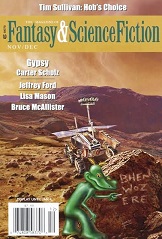 Fantasy & Science Fiction, November/December 2015
Fantasy & Science Fiction, November/December 2015
“The Winter Wraith” by Jeffrey Ford
Reviewed by Robert L Turner III
In “The Winter Wraith” Jeffrey Ford puts together a tale of dread based only on an old Christmas tree and some uncanny events tied to being home alone in winter. The language is evocative and effectively paints the picture of the house and the narrative voice. The inconclusive nature of the story fits well with the tone and provides the reader with an enjoyable frisson as the tale ends.
“Hob’s Choice” by Tim Sullivan reads as part of a larger narrative that doesn’t work without more context. Hob, the main character, has been sent to Cet Four to deliver a message to a resistance faction who wishes to help the indigenous species of the planet. Various events, none of any seeming import occur and the story ends with a deus ex machina. The publisher notes that the author has published multiple stories in this universe and perhaps together they provide a better view, but as a stand-alone story I am unimpressed. I was particularly put off by the stilted dialogue which tends towards short choppy sentences. While there are some interesting elements in the story, nothing is developed to the point where it grabs the reader’s attention. Overall the story is bland and uninteresting.
“The Thirteen Mercies” is a complex and sobering read in which religion, magic and war are woven into an almost hallucinogenic whole. Maria Dahvana Headley’s narrative voice is reminiscent of Jorge Luis Borges’ work or some of Robert Silverberg’s more experimental short stories. In it, a group of soldiers condemned for war crimes is sent into tropical exile while a long delayed mystical justice comes for them. The story raises some interesting questions about vengeance, our roles in life and the nature of hate. While I didn’t personally enjoy the work, I must admire the quality of the story and the craftsmanship of the author.
“Gypsy” by Carter Scholz is a novella length work that is well worth the time needed to digest. Starting from the standard refugees-from-a-dying-Earth narrative, Scholz creates a believable world in which desperate geniuses make a last ditch attempt to settle a new planet. The differing POV’s and the way in which they create a patchwork story is well done and provides a satisfying read. The story is at its best as the various characters deal with entropy over the course of their trip.
“Her Echo” by KJ Kabza is a flash fiction piece that, while entertaining, doesn’t go beyond that. In it, the remnants of a wise woman, her Reflection, Shadow, and Echo spy on, and attempt to woo, a handsome young man. The idea is fairly novel and the writing solid, but the story has no impact. Overall a decent read and at barely 600 words, a quick one.
In “The Fabulous Follicle” Harvey Jacobs tells the story of a barber to werewolves. The story is amusing and makes for a quick read. Don’t look for deep meaning or life changing revelations, but it is an enjoyable ten minute story.
Bruce McAllister makes the most of his story’s limited length in “DreamPet.” In it, an overworked executive experiences the growing dislocation from his family and struggles to deal with the consequences of his choices. The story manages to convey the struggles common to life using a convincing minimalism which enables the reader to infer the larger narrative. Overall, it is an excellent story.
In “Cleanout” by Naomi Kritzer three sisters are faced with the task of cleaning out their mother’s home after she has a stroke. As they do, they come across hints that their immigrant parents came from further away than they had suspected. The story mixes the stresses and concerns of contemporary life with elements of magical realism and the conclusion is pitch perfect.
“It’s All Relative at the Space-Time Café” by Norman Birnbach is essentially an excuse to create multiple puns. The story itself is nothing more than a medium to pack as many science jokes a possible into 2000 words. The effort is hit or miss with the reference to the Schwarzschild radius being particularly good. Other jokes fall flat and feel forced. Whether you enjoy it will depend on how strong your liking for jokes about string theory is.
The City of Your Soul” by Robert Reed is an interesting “what if” story that crosses multiple realities with midlife crisis. The narrative voice using present tense and second person voice adds the feel of an internal monologue that complements the theme well. In it, a city disappears and reappears and the protagonist is one of the few to remember the change. As the title indicates, this acts as a metaphor for an internal dislocation as well. The story overall is strong, but the concluding paragraph lacks punch as the author makes a callback to the beginning that doesn’t quite work. This story will appeal to fans of literary fiction.
“Tomorrow is a Lovely Day” by Lisa Mason is a clever take on time looping. The protagonist, Benjamin, is stuck in an infinite loop created in an attempt to stave off the end of the world. The writing is tight and Mason’s use of classical allusions adds depth to the tale. The conclusion is satisfying and points the reader towards a consideration of the nature of time and the various cycles of life that it encompasses.
Robert Turner is a Spanish professor at the University of South Dakota with a side line in Science Fiction.